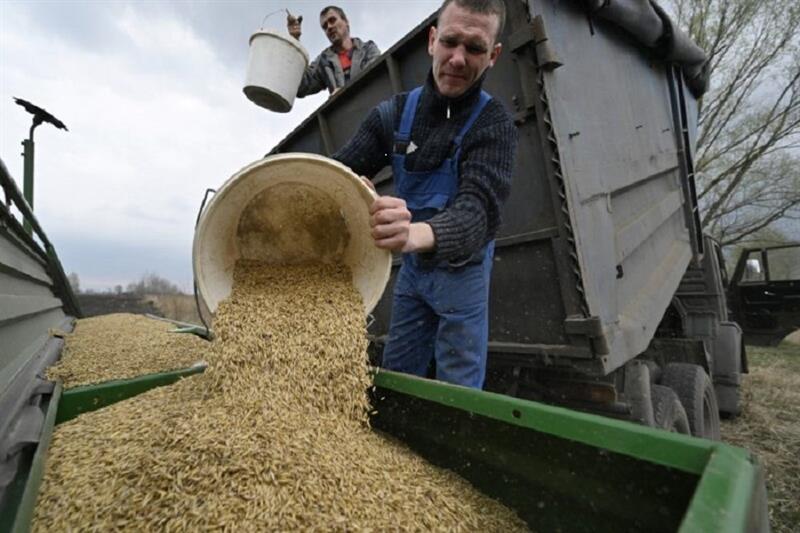
Farmers load oat in the seeding-machine to sow in a field east of Kyiv on April 16, 2022. AFP
The Russian statement stressed that Russia’s supply of wheat “will continue” in accordance with agreements with Egypt’s Ministry of Supply and Internal Trade and contracts with private companies.
The statement came in response to the G7 countries’ joint statement a day earlier in which the ambassadors of Canada, France, Germany, Italy, Japan, the United Kingdom, the United States, and the EU in Cairo – said they support Egypt in the grain crisis caused by Russia.
“Russia itself chose to stop its own exports of many sorts of grain due to the war and decided to only feed ‘friendly nations’... Regardless as to what Russian officials might say regarding cooperation with Egypt, they cannot explain away the hardships this war of aggression is causing in Egypt. Russia might announce one or two ships of grain bound for Egypt, yet this only makes it clearer that Putin stopped these exports in the first place,” the G7 said on Tuesday.
In Wednesday’s statement, Moscow condemned the allegations of the “US and its followers” that said that Russia "bombs the agricultural fields of Ukraine and prevents the planting season,” describing it as “a shameful lie. ”
Moscow further explained that the “Russian forces direct their strikes towards the locations of the enemy forces” who are opposed to Russia in the Donbas region, as well as armoury depots and military-industrial sites.
The Russian statement noted that Ukrainian communists are excessively shelling residential districts and farmlands, using weapons and missile launchers they received from the North Atlantic Treaty Organisation (NATO).
Russia said that for four months Washington and its allies have misled the world that Russia has placed a blockade on the ports of Ukraine, and “this is an abominable lie.”
“Its work is hampered by the pro-Western Ukrainian authorities who have planted naval mines and refuse to remove them, which has led to the fact that merchant ships are unable to reach or leave the ports, including transporting wheat to Egypt,” the Russian ambassador said.
“These are the Western countries whose sanctions have destroyed the supply chains of agricultural products and the mechanisms of payments for them,” the Russian ambassador said, adding that the American and European politicians are trying to destroy the Russian economy in order to deprive humanity of the largest and most secure food resource.
The world sees that the merciless Western countries that seek global hegemony are immersed in lies and are pushing the world into a food crisis, the ambassador said, stressing “I am sure that our Egyptian friends understand this well.”
The G7 stated a day earlier that Russia is blaming the sanctions imposed by G7 countries and others for the imminent food crisis, stating “this is false.”
“Our sanctions target those responsible for the war. They exclude food supplies, agricultural commodities and other humanitarian as well as medical goods. They are a means to stop Russia’s war machine, which is causing the global food crisis,” the G7 statement said.
Egypt, the world's biggest wheat importer, relied on Russian and Ukrainian wheat imports for 80 percent of its needs of the grain before the outbreak of the Russian-Ukrainian war in February.
The country started to diversify its sources of wheat imports following the outbreak of the war that led to major disruptions in the grain's supply.
During the first week of May, Egypt signed a deal to import 61,500 tons of Indian wheat.
The government has also given monetary incentives to Egyptian farmers to grow and supply more wheat, which is used to produce bread a key staple for the population.
The supply ministry is expected to receive six million tons of wheat during the local supply season - 2.5 million tons more than in 2021.
The country requested in late May $500 million from the World Bank (WB) to buy wheat through the Emergency Food Security and Resilience Support Project, according to a document released by the WB.
According to the Egyptian cabinet, Egypt has a strategic wheat reserve for domestic consumption sufficient till the end of 2022.
In early June, Egypt’s General Authority for Supply Commodities (GASC) announced that it has signed a contract to purchase 465,000 tons of wheat from Russia, Bulgaria and Romania in what is reportedly the country’s largest wheat purchase since the start of the Russian invasion of Ukraine.
Short link: